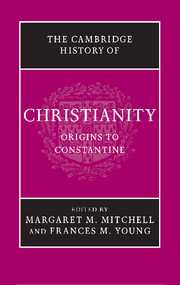Book contents
- Frontmatter
- Prelude: Jesus Christ, foundation of Christianity
- Part I The Political, Social and Religious Setting
- Part II The Jesus Movements
- Part III Community Traditions and Self-Definition
- 8 The emergence of the written record
- 9 Marcion and the ‘canon’
- 10 Self-definition vis-à-vis the Jewish matrix
- 11 Self-definition vis-à-vis the Graeco-Roman world
- 12 Self-differentiation among Christian groups: the Gnostics and their opponents
- 13 Truth and tradition: Irenaeus
- 14 The self-defining praxis of the developing ecclēsia
- Part IV Regional Varieties of Christianity in the First Three Centuries
- Part V The Shaping of Christian Theology
- Part VI ‘Aliens’ become Citizens: towards Imperial Patronage
- Conclusion: retrospect and prospect
- Bibliographies
- Index
- Map 1. The Roman Empire in the time of Marcus Aurelius
- References
10 - Self-definition vis-à-vis the Jewish matrix
from Part III - Community Traditions and Self-Definition
Published online by Cambridge University Press: 28 March 2008
- Frontmatter
- Prelude: Jesus Christ, foundation of Christianity
- Part I The Political, Social and Religious Setting
- Part II The Jesus Movements
- Part III Community Traditions and Self-Definition
- 8 The emergence of the written record
- 9 Marcion and the ‘canon’
- 10 Self-definition vis-à-vis the Jewish matrix
- 11 Self-definition vis-à-vis the Graeco-Roman world
- 12 Self-differentiation among Christian groups: the Gnostics and their opponents
- 13 Truth and tradition: Irenaeus
- 14 The self-defining praxis of the developing ecclēsia
- Part IV Regional Varieties of Christianity in the First Three Centuries
- Part V The Shaping of Christian Theology
- Part VI ‘Aliens’ become Citizens: towards Imperial Patronage
- Conclusion: retrospect and prospect
- Bibliographies
- Index
- Map 1. The Roman Empire in the time of Marcus Aurelius
- References
Summary
To speak of early Christian self-definition is to recognise that the sense of self always implies differentiation from one or more ‘others’. This and the following chapter identify those significant ‘others’ as the ‘Jewish matrix’ and the ‘Graeco-Roman world’; differentiation from ‘Gnostic’ groups (ch. 12 below) is arguably different in kind. A significant point, then, on the path towards differentiation, although not its culmination, might be the self-understanding of the Christians as a ‘third race’, alongside the Greeks and the Jews; this emerges at the end of the second century, and was, perhaps, adopted from the taunts of outsiders. Yet, as we shall discover, just as early Christianity necessarily remained part of the Graeco-Roman world, so in one sense it inevitably would always be positioned in relationship to a Jewish matrix. The familiar epithet, ‘Judaeo-Christian tradition’, while in danger of implying a common voice where none is to be heard, acknowledges a truth that is rooted in the very origins of Christianity, in the ministry of ‘Jesus, the Jew’.
Our task is to plot how, within a Jewish framework, individuals and, more importantly, the groups of which they were a part, who were characterized by a commitment to the person and memory of Jesus, developed a sense of what united them over against other Jews and Jewish groups, whilst sustaining an absolute claim to what we might call their ‘Jewish heritage’.
Keywords
- Type
- Chapter
- Information
- The Cambridge History of Christianity , pp. 214 - 229Publisher: Cambridge University PressPrint publication year: 2006
References
- 2
- Cited by

